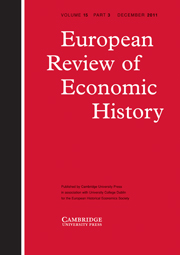Article contents
Rearranging deck chairs on the Titanic: English banking concentration and efficiency, 1870–1914
Published online by Cambridge University Press: 07 September 2006
Abstract
This article examines the bank amalgamation movement in England between 1870 and 1914. I assemble data on all publicly traded English bank equities and use a simple finance model to estimate the effects of concentration. Holding returns on English bank stocks declined steadily over the period, which I attribute to a negative demand shock resulting from banks' declining importance relative to other financial intermediaries. Once this decline is accounted for, increased concentration appears to have bolstered bank returns. This suggests that increased concentration may have rendered English banks less efficient as allocators of capital and may have contributed to Britain's industrial decline.
[The amalgamation] movement appears to have by no means reached its limits, and it is neither safe nor easy to predict with any confidence the eventual outcome of a movement of which the development is incomplete. Whether or not … in the course of a few more years all banking business in this country will be monopolised by some half dozen powerful institutions, there seems little reason to doubt that many of the old inducements to amalgamation still operate, and that the closing years of the century will witness a further reduction in the number of existing banks. In any event, conjecture as to the ultimate outcome of the tendency must be mainly based on past experience, and in light of that experience the question of whether the movement is likely on the whole to be a beneficial one must be discussed.1
- Type
- Articles
- Information
- Copyright
- Cambridge University Press 1999
- 7
- Cited by




